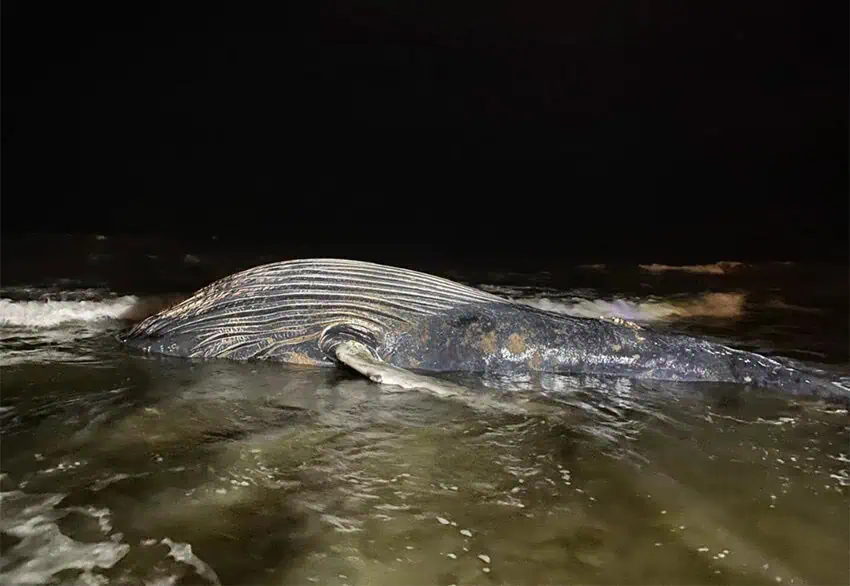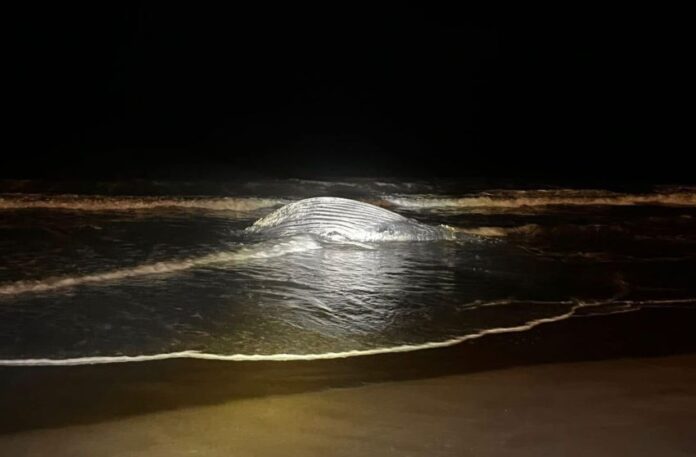For the second time in a month, a whale has washed up on a beach in Mazatlán, Sinaloa, apparently killed by a fishing net.
The giant mammal was enmeshed in a fishing net and the visible damage the animal suffered suggested it had been wrapped in the net for some time.
Hallan ballena jorobada varada en Mazatlán la noche del miércoles 🐋. Presentaba redes de pesca en su cuerpo, un recordatorio del impacto humano en especies protegidas. 🌊 #Mazatlán #ProtecciónAmbiental #BallenaJorobada #Ballena pic.twitter.com/RSFmxWQqXC
— La Jornada (@lajornadaonline) January 10, 2025
On Wednesday night, local residents gathered along city’s oceanside malecón where the enormous whale came ashore. Local civil protection authorities responded quickly to the alert, but the animal — identified as a young humpback whale — was already dead.
Along with employees of the Mazatlán aquarium and agents from both the Environment Ministry (Semarnat) and the federal environmental protection agency (Profepa), the local authorities managed to remove the carcass.
The whale — presumed to be a young humpback as it was measured at 8 meters and 15 metric tons, whereas adults of that species can reach 18 meters in length and weigh up to 36 metric tons — was removed and buried in an unspecified location.
Semarnat and Profepa have begun an investigation into the circumstances surrounding the whale’s death.

Initial suspicions are that the whale got entangled in gillnetting, a type of fishing gear that consists of a wall of netting that hangs in the water. Floats keep the net, typically made of monofilament or multifilament nylon, vertical at the top and weights hold the net down at the bottom.
Gillnets — which are illegal in specified Mexican waters including the upper Gulf of California — are used to catch fish by entangling their gills, fins, and spines. They are also a major source of mortality for all sea turtle species and can entangle a wide variety of marine mammals, according to the U.S. National Oceanic and Atmospheric Administration (NOAA).
Depending on the mesh size of the gillnet, animals can become entangled around their necks, mouths, and flippers, NOAA warns. “Entanglement can prevent proper feeding, constrict growth, or cause infection after many months. Marine mammals entangled in set gillnets can drown while those entangled in drift gillnets can drag gear for miles as they migrate and forage, leading to extreme fatigue.”
Gillnets are frequently used by local fishermen according to the newspaper El Imparcial, and are a leading cause of death for cetaceans. The investigators will try to determine if the netting caused serious injury or led directly to the whale’s death.
Mazatlán Mayor Estrella Palacios said the type of gillnet involved, locally known as a chinchorro, is prohibited in Mexico and called on fishermen to properly dispose of their nets.
It’s necessary to “raise awareness so our fishermen understand they can’t leave behind these chinchorros because the whales get tangled in them, causing these regrettable losses,” she said.
Another humpback whale washed up on Mazatlán’s Playa Cerritos on Dec. 15 That whale — measuring approximately 10 meters in length — was already in a severe state of decomposition and the cause of death was unclear.
With reports from El Imparcial, El Sol de Mazatlán, Luz Noticias and La Jornada
